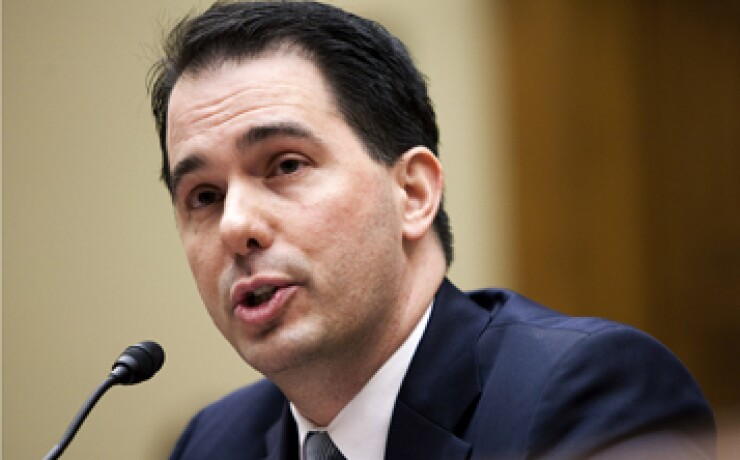
CHICAGO — Wisconsin's tab to repay $220 million in proposed borrowing for a new Milwaukee Bucks basketball arena ranges from $324 million to $488 million, according to a new
The numbers differ depending on whether the state ties debt service to expected growth in players' income taxes.
Gov. Scott Walker earlier this year unveiled the proposal to help finance a new stadium for the National Basketball Association team that would rely on growth in income taxes expected from Bucks players, team employees, visiting teams, and media contracts.
Supporters promote the subsidy as a way to keep the team and preserve $270 million in existing revenue expected to be generated over the life of the borrowing. The Bucks' owners — Wes Edens and Marc Lasry — and its previous owner, former U.S. Sen. Herb Kohl, are expected to contribute several hundred million dollars to the project that is estimated to cost $400 million to $500 million.
The state currently collects about $6.5 million in income taxes on players. The state would set that amount as its base and keep those funds in the future. Growth in tax revenue would be tapped to repay the bonds.
The governor's proposed legislation would create a Sports and Entertainment District to manage the arena, although it would not be authorized to borrow.
The Department of Administration's capital finance division would be authorized to issue up to $220 million of appropriation bonds to fund a grant to the district.
The non-partisan Legislative Fiscal Bureau's report lays out the repayment costs, highlighting differences based on structure.
The state has not settled on a structure, but officials have said they favor one that mirrors projected growth in team-related revenue. Under that scenario, the state would issue tax-exempt bonds at a rate of about 4% with a 30-year repayment structure. Delayed interest and principal repayment would raise the overall cost of the financing to $488.4 million.
"The administration's policy decision to structure the proposed bond issue so that the amount of debt service due each year on the bonds would be notionally tied to, or mirror, the additional income taxes results in an amortization schedule that cannot meet the interest due on the bonds in the early years of the transaction and back-end loads the repayment of principal to the later years of the transaction," the report says.
"This results in the bonding transaction having higher overall costs than if the amortization schedule had more uniform annual debt service payments," it says.
The $220 million would provide $175 million toward construction, $25 million for transportation and other infrastructure, and $20 million for ongoing maintenance at the Bucks' current home at the BMO Harris Bradley Center.
The state could lower the overall bill by adopting a level amortization schedule which would bring the repayment tab down to $381.7 million.
"General fund tax revenues, other than those associated with the projected growth in the incomes of NBA related personnel would be needed for the debt service on the bonds for the first 14 years of the transaction," the report read.
The bureau also examined a 20-year repayment schedule with a level amortization schedule which would result in total repayment of $323.8 million.
Given the funding makeup for the proposed arena facility and how the debt service on the $220 million bond issue would be repaid, it is likely that the bonds would qualify for tax-exempt status under the private payments test, according to the report.
The report highlights President Obama's proposal to eliminate the private payments test in his proposed budget. If changed, bonds issued to finance professional sports facilities would be taxable private activity bonds if more than 10% of the facility is used for private business use. The Bucks arena bonds would fail that test and be taxable.
As part of the sale, Kohl pledged to contribute $100 million toward the cost of the new arena while the new owners have pledged $150 million. The league has been pushing for a new venue to replace the 26-year-old, 18,600-seat BMO Bradley Center arena and warned without a new one the team is likely to be relocated. The Bucks' lease runs through the 2016-2017 season.
It's unclear what aid lawmakers will eventually endorse, if any.
Republican Assembly Speaker Robin Vos has said he would back only a lower level of bonding for the project while Republican Senate Majority Leader Scott Fitzgerald recently said he is reviewing an alternative to bonding.





